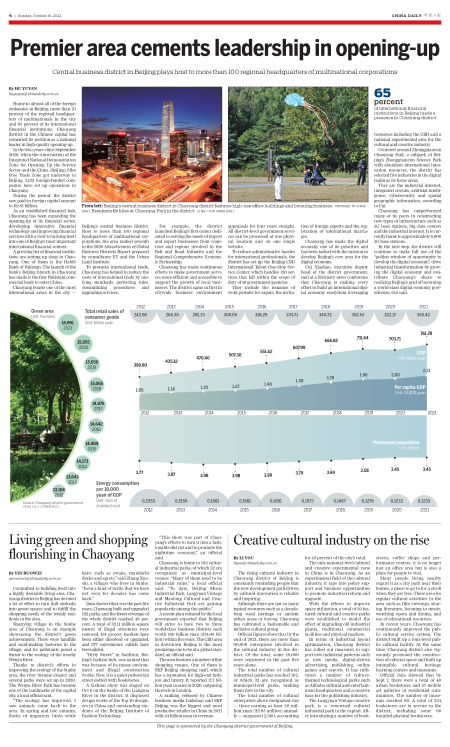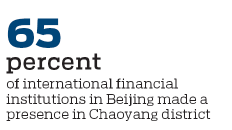
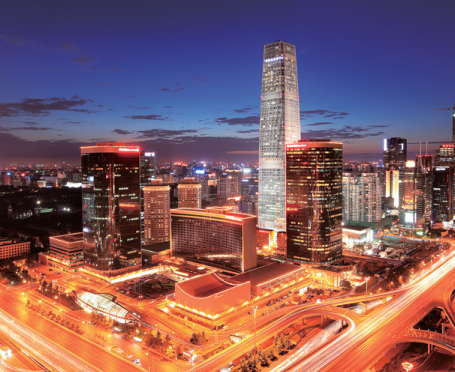
Beijing's central business district in Chaoyang district features high-rise office buildings and booming business.
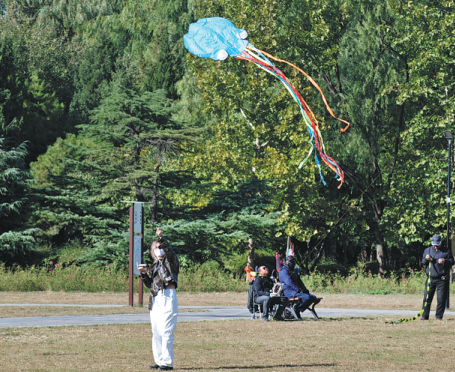
Residents fly kites at Chaoyang Park in the district.
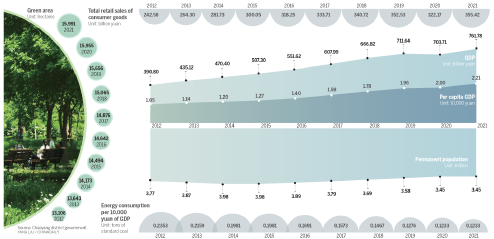
Home to almost all of the foreign embassies in Beijing, more than 70 percent of the regional headquarters of multinationals in the city and 65 percent of its international financial institutions, Chaoyang district in the Chinese capital has cemented its position as a national leader in high-quality opening-up.
In the two years since September 2020, when the construction of the Integrated National Demonstration Zone for Opening Up the Service Sector and the China (Beijing) Pilot Free Trade Zone got underway in Beijing, 1,133 foreign-funded companies have set up operations in Chaoyang.
During the period, the district saw paid-in foreign capital amount to $9.81 billion.
As an established financial hub, Chaoyang has been expanding the opening-up of its financial sector, developing innovative financial technology and improving financial services with a view to turning itself into one of Beijing's most important international financial centers.
A growing list of financial institutions are setting up shop in Chaoyang. One of them is the Habib Bank of Pakistan. The launch of the bank's Beijing branch in Chaoyang has made it the first Pakistani commercial bank to enter China.
Chaoyang boasts one of the most international areas in the city — Beijing's central business district. Host to more than 100 regional headquarters of multinational corporations, the area ranked seventh in the 2020 Attractiveness of Global Business Districts Report prepared by consultancy EY and the Urban Land Institute.
To promote international trade, Chaoyang has helped to reduce the costs of international trade by unifying standards, perfecting rules, streamlining procedures and upgrading services.
For example, the district launched Beijing's first center dedicated to serving the needs of import and export businesses from countries and regions involved in the Belt and Road Initiative and the Regional Comprehensive Economic Partnership.
Chaoyang has made continuous efforts to make government services more efficient and accessible to support the growth of local businesses. The district came in first in citywide business environment appraisals for four years straight. All district-level government services can be processed at one physical location and on one single website.
To reduce administrative hassles for international professionals, the district has set up the Beijing CBD International Talent One-Stop Service Center, which handles 120 services that fall within the scope of duty of 19 government agencies.
They include the issuance of work permits for expats, the invitation of foreign experts and the registration of international marriages.
Chaoyang has made the digital economy one of its priorities and has been tasked with the mission to develop Beijing's core area for the digital economy.
Cui Xiaohao, executive deputy head of the district government, said at a February news conference that Chaoyang is making every effort to build an international digital economy ecosystem leveraging resources including the CBD and a national experimental area for the cultural and creative industry.
Centered around Zhongguancun Chaoyang Park, a subpark of Beijing's Zhongguancun Science Park with abundant international innovation resources, the district has selected five industries in the digital realm as its focus areas.
They are the industrial internet, integrated circuits, artificial intelligence, cybersecurity and spatial geographic information, according to Cui.
Chaoyang has outperformed many of its peers in constructing new types of infrastructure such as 5G base stations, big data centers and the industrial internet. It is currently home to approximately 4,800 5G base stations.
In the next step, the district will continue to make full use of the "golden window of opportunity to develop the digital economy", drive industrial transformation by growing the digital economy and contribute Chaoyang's share to realizing Beijing's goal of becoming a world-class digital economy powerhouse, Cui said.
huyuyan@chinadaily.com.cn
